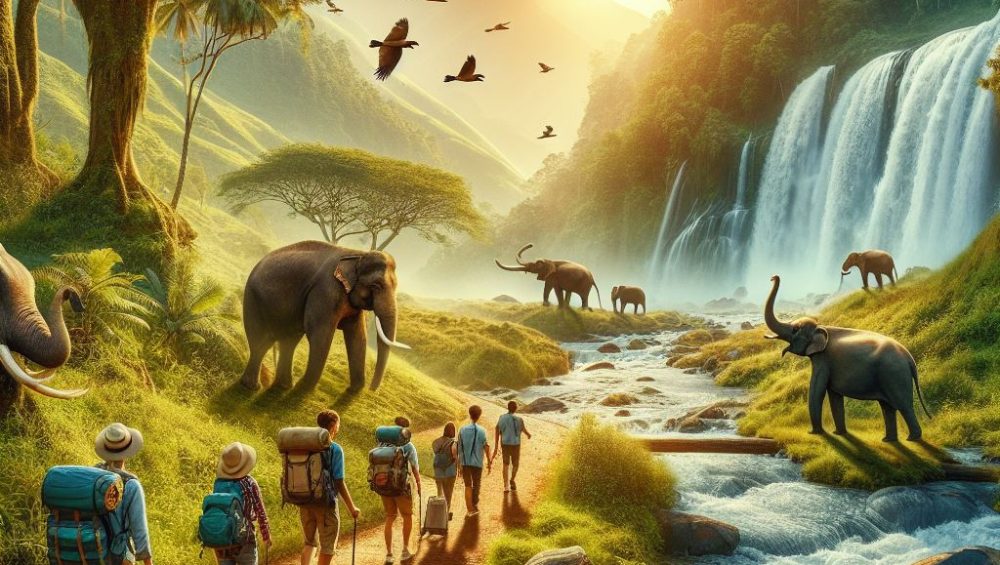Outline
- Introduction to Kerala: The Land of Divinity
– Brief history and significance
- Natural Beauty of Kerala
– Backwaters
– Beaches
– Hill Stations
- Cultural Diversity and Heritage
– Art forms and festivals
– Traditional attire and cuisine
- Ayurveda and Wellness Tourism
– Healing traditions
– Wellness resorts and treatments
- Wildlife and Ecotourism
– National parks and sanctuaries
– Responsible tourism initiatives
- Religious Harmony and Pilgrimage Sites
– Temples, churches, and mosques
– Spiritual significance
- Adventure and Activities
– Trekking and hiking
– Water sports
- Sustainable Development and Green Initiatives
– Eco-friendly practices
– Community-based tourism projects
- Famous Attractions and Landmarks
– Munnar tea plantations
– Alleppey houseboats
– Periyar Wildlife Sanctuary
- Homestays and Cultural Immersion
– Authentic experiences with local families
– Learning traditional crafts and skills
- Connectivity and Accessibility
– Transportation options
– Connectivity within Kerala
- Best Time to Visit
– Climate and weather patterns
– Peak tourist seasons
- Accommodation Options
– Luxury resorts
– Budget-friendly stays
- Tips for Travelers
– Packing essentials
– Cultural etiquette
- Conclusion: Embracing the Spirit of Kerala
—
Exploring God’s Own Country: Kerala
Kerala, often referred to as “God’s Own Country,” is a land of captivating beauty, rich cultural heritage, and serene landscapes. Nestled in the southwestern region of India, Kerala boasts a diverse range of attractions that make it a must-visit destination for travelers seeking a blend of natural wonders, cultural experiences, and spiritual enlightenment.
-
Introduction to Kerala: The Land of Divinity
Kerala’s history dates back centuries, with ancient trade routes bringing influences from around the world to its shores. Known for its lush greenery, tranquil backwaters, and vibrant culture, Kerala has earned its title as “God’s Own Country” due to its unparalleled beauty and spiritual aura.
-
Natural Beauty of Kerala
Backwaters
One of Kerala’s most iconic features is its extensive network of backwaters, consisting of interconnected lakes, rivers, and canals. A houseboat cruise along the serene backwaters offers a unique opportunity to witness the tranquil beauty of Kerala’s countryside.
Beaches
Kerala is blessed with pristine beaches along its coastline, offering breathtaking sunsets and opportunities for relaxation and water sports. From the popular beaches of Kovalam and Varkala to the secluded shores of Marari, each beach has its own charm and allure.
Hill Stations
The hill stations of Kerala, such as Munnar and Wayanad, provide a refreshing escape from the heat of the plains. With their cool climate, tea plantations, and mist-covered mountains, these hill stations are perfect for trekking, birdwatching, and nature walks.
-
Cultural Diversity and Heritage
Kerala is renowned for its rich cultural heritage, which is reflected in its diverse art forms, festivals, and traditions.
Art Forms and Festivals
From classical dance forms like Kathakali and Mohiniattam to vibrant festivals like Onam and Thrissur Pooram, Kerala’s cultural scene is vibrant and dynamic. These celebrations showcase the state’s artistic prowess and traditional values.
Traditional Attire and Cuisine
The traditional attire of Kerala, including the elegant white saree with gold borders worn by women and the dhoti and mundu worn by men, reflects the state’s heritage and customs. Kerala’s cuisine, known for its use of coconut, spices, and seafood, is a culinary delight for food enthusiasts.
-
Ayurveda and Wellness Tourism
Healing Traditions
Kerala is a pioneer in Ayurveda, the ancient system of holistic healing. Visitors can experience rejuvenating Ayurvedic treatments and therapies at wellness resorts and Ayurvedic centers located amidst serene natural surroundings.
Wellness Resorts and Treatments
Wellness tourism is a thriving industry in Kerala, with numerous resorts and spas offering a range of Ayurvedic treatments, yoga retreats, and meditation sessions. These wellness experiences promote physical, mental, and spiritual well-being.
-
Wildlife and Ecotourism
National Parks and Sanctuaries
Kerala is home to several national parks and wildlife sanctuaries, including Periyar Tiger Reserve and Wayanad Wildlife Sanctuary. These protected areas provide sanctuary to diverse flora and fauna, including elephants, tigers, and rare bird species.
Responsible Tourism Initiatives
Kerala is committed to sustainable tourism practices, with initiatives focused on conservation, community empowerment, and responsible tourism. Visitors can participate in eco-friendly activities such as nature walks, birdwatching, and tree planting initiatives.
-
Religious Harmony and Pilgrimage Sites
Temples, Churches, and Mosques
Kerala is known for its religious diversity, with temples, churches, and mosques coexisting harmoniously. The state is home to iconic religious landmarks such as the Padmanabhaswamy Temple, St. Francis Church, and Cheraman Juma Mosque.
Spiritual Significance
Pilgrimage sites in Kerala hold deep spiritual significance for devotees and tourists alike. Whether it’s seeking blessings at the Sabarimala Temple or experiencing the tranquility of the St. Thomas Syro-Malabar Catholic Church, these sacred sites offer moments of reflection and spiritual renewal.
-
Adventure and Activities
Trekking and Hiking
Kerala’s diverse terrain offers ample opportunities for adventure enthusiasts to embark on thrilling trekking and hiking expeditions. Trails through dense forests, tea estates, and mountainous landscapes provide unforgettable experiences for nature lovers.
Water Sports
The coastal regions of Kerala are perfect for indulging in a variety of water sports, including surfing, kayaking, and snorkeling. The crystal-clear waters of the Arabian Sea beckon visitors to explore its underwater wonders and vibrant marine life.
-
Sustainable Development and Green Initiatives
Eco-Friendly Practices
Kerala is committed to promoting sustainable development and preserving its natural resources. Initiatives such as waste management programs, renewable energy projects, and organic farming practices contribute to the state’s eco-friendly ethos.
Community-Based Tourism Projects
Community-based tourism initiatives empower local communities and promote cultural exchange between visitors and residents. Homestays, village tours, and craft workshops offer authentic experiences that support sustainable livelihoods and preserve traditional crafts.
-
Famous Attractions and Landmarks
Munnar Tea Plantations
The picturesque town of Munnar is famous for its sprawling tea plantations, lush green valleys, and misty mountains. Visitors can tour tea estates, learn about the tea-making process, and enjoy panoramic views of the surrounding landscape.
Alleppey Houseboats
A houseboat cruise through the backwaters of Alleppey is a quintessential Kerala experience. These traditional kettuvallams offer luxurious accommodations and scenic views of the tranquil backwaters, making for a memorable journey.
Periyar Wildlife Sanctuary
Located in the Western Ghats, the Periyar Wildlife Sanctuary is a haven for wildlife enthusiasts and nature lovers. Boat safaris on the Periyar Lake provide opportunities to spot elephants, deer, and exotic bird species in their natural habitat.
-
Homestays and Cultural Immersion
Authentic Experiences with Local Families
Staying in a traditional homestay allows visitors to immerse themselves in Kerala’s culture and way of life. Host families welcome guests with warm hospitality, homemade meals, and insights into local customs and traditions.
Learning Traditional Crafts and Skills
Many homestays offer hands-on experiences such as cooking classes, handicraft workshops, and cultural performances, allowing visitors to learn traditional crafts and skills directly from skilled artisans and craftsmen.
-
Connectivity and Accessibility
Transportation Options
Kerala is well-connected by air, rail, and road, making it easily accessible from major cities across India and abroad. Public transportation options such as buses, taxis, and auto-rickshaws provide convenient travel within the state.
Connectivity Within Kerala
Efficient transportation networks ensure seamless connectivity between Kerala’s various destinations, allowing travelers to explore the state’s diverse attractions with ease.
-
Best Time to Visit
Climate and Weather Patterns
Kerala enjoys a tropical climate throughout the year, with relatively high humidity and temperatures. The best time to visit depends on individual preferences, with the monsoon season offering lush greenery and the winter months providing pleasant weather for outdoor activities.
Peak Tourist Seasons
The peak tourist seasons in Kerala are during the winter months (October to February) and the festival season (August to September), when the weather is mild, and cultural festivities are in full swing.
-
Accommodation Options
Luxury Resorts
Kerala offers a range of luxury resorts and boutique hotels that cater to discerning travelers seeking indulgent amenities and personalized service. From beachfront villas to hilltop retreats, these accommodations promise a luxurious stay amidst natural beauty.
Budget-Friendly Stays
For budget-conscious travelers, Kerala offers a variety of affordable accommodation options, including guesthouses, hostels, and budget hotels. These establishments provide comfortable lodging without compromising on quality or convenience.
-
Tips for Travelers
Packing Essentials
When packing for a trip to Kerala, it’s essential to include lightweight and breathable clothing, sunscreen, insect repellent, and comfortable footwear. Additionally, carrying a reusable water bottle and eco-friendly toiletries can help reduce environmental impact.
Cultural Etiquette
Respecting local customs and traditions is crucial when visiting Kerala. Visitors should dress modestly, remove footwear before entering religious sites, and seek permission before photographing people or sacred objects.
-
Conclusion: Embracing the Spirit of Kerala
Kerala’s allure lies in its ability to captivate visitors with its natural beauty, cultural heritage, and warm hospitality. Whether exploring the tranquil backwaters, indulging in Ayurvedic wellness treatments, or immersing oneself in local traditions, a journey through God’s Own Country promises unforgettable experiences and cherished memories.
—
FAQs
- What is the significance of Kerala’s backwaters?
The backwaters of Kerala are a unique ecosystem consisting of interconnected lakes, rivers, and canals. They play a vital role in the state’s economy and provide livelihoods for local communities.
- What are some popular dishes to try in Kerala?
Kerala’s cuisine is known for its use of coconut, spices, and seafood. Some must-try dishes include appam with stew, fish curry, and traditional Kerala sadhya served on a banana leaf.
- Is Kerala safe for solo female travelers?
Kerala is considered one of the safest states in India for solo female travelers. However, it’s essential to exercise caution and adhere to common-sense safety precautions while exploring the region.
- What are the best places for wildlife spotting in Kerala?
Periyar Tiger Reserve, Wayanad Wildlife Sanctuary, and Silent Valley National Park are among the best places in Kerala for wildlife enthusiasts to spot elephants, tigers, and rare bird species.
- What is the traditional attire of Kerala?
The traditional attire of Kerala for women is the white saree with gold borders, while men typically wear the dhoti or mundu paired with a shirt.





